By Paul Rozycki
It’s common to refer to every upcoming election as “the most important election” of our times. Most of the time that’s just political rhetoric to get people out to vote.
Yet, this Nov. 8 mid-term election may be the exception to that old rubric. Yes, it’s just one more mid-term election, but there is a lot at stake this year. To make things even more complex, this is the first election after the redistricting process at the start of the decade. Thus, many voters and candidates will be in different districts than those in the past decade.
What’s at stake this year?
National elections
On the national level the control of Congress is at stake. All 435 members of the house are up for reelection, and 34 of the 100 Senate seats are on the ballot this year. Over the last 50 years the party in the White House typically has lost 35 or more seats in the House and several Senate seats as voters turn on the party in power.
A loss of just five seats or more by Democrats in the U.S. House will give the Republicans the majority for at least the next two years. In the U.S. Senate the parties are split 50-50 with Vice-president Kamala Harris breaking any tie votes. This year 20 Republican senators and 14 Democratic senators are facing the voters. While the chances are slim for the Democrats to hold the House, they have some hope of keeping or expanding their working majority in the U.S. Senate.

Photo by Paul Rozycki.
A Republican majority in the House would certainly mean the end of the Jan. 6 Committee hearings and could lead to attacks on the Department of Justice as they pursue criminal charges against those involved in the Jan. 6 riots. Other key issues next year will be possible legislation on abortion and the legitimacy of the 2020 election.
State elections
On the state level, Michigan will be electing a governor, secretary of state, and attorney general, as well as members of the state House of Representatives, state Senate, state school board, university boards, and a number of judicial positions.
Most significant is the fact that several of those running for state-wide office are “election deniers” who claim, without evidence, that the 2020 election was stolen. That doesn’t augur well for creating trust in future elections as we approach the 2024 contest. Nationwide, 36 of the 50 states are electing governors, 30 are selecting attorneys general, 27 are voting for the secretary of state, and more than 6000 legislative races are on the ballot.
Michigan ballot proposals
In addition, voters will decide three major proposals that would amend the Michigan Constitution.
Proposal 1
Proposal 1 combines two distinct issues: term limits and financial disclosure. The first part of the proposal would change the current term limits and allow state lawmakers to serve a total of 12 years either in the House or the Senate. Currently lawmakers are limited to three two-year terms in the House and two four-year terms in the Senate.
A second part of Proposal 1 would require the governor, lieutenant governor, secretary of state, attorney general and all state House members and Senators to file annual reports disclosing their income, assets, liabilities, and positions held outside of government.
Michigan is one of only a few states lacking significant financial disclosure laws.
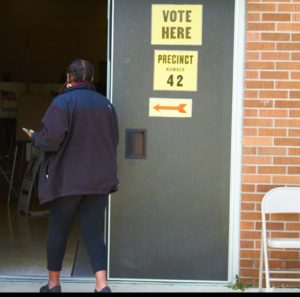
Voter entering a local polling station at Durant-Tuuri Mott School. (Photo by Tom Travis)
Proposal 2
Proposal 2, called Promote the Vote, would require a number of actions to make it easier to vote. It would require nine days of early in-person voting, provide state-funded absentee drop boxes throughout the state, (one for every 15,000 voters), provide postage for absentee ballots and applications and allow military and overseas ballots to be counted if they were postmarked by Election Day. It would also bar harassment at the polls, allow private donations to fund election operations, as long as they are disclosed and it would require that post-election audits be conducted only by election officials.
Proposal 3
The proposal getting the most attention is certainly Proposal 3, which would provide a constitutional guarantee of a women’s right to an abortion and “a fundamental right to reproductive freedom.” It would repeal the 1931 law that made it a felony to provide an abortion to a woman. After the U.S. Supreme Court overturned Roe v. Wade a few months ago, this proposal has garnered over 750,000 signatures, a record number, and many expect it to be a major factor in driving up turnout on the midterm elections. The Supreme Court’s action on abortion has become a major issue in many campaign nationwide; Proposal 3 makes it even more significant in Michigan’s election this year.

Protestors at a Defend Roe March in downtown Flint on Saturday, May 14. (Photo by Tom Travis)
Local elections
On the local level, Flint will elect a mayor and voters in Genesee County will choose nine county commissioners, as well as township officials, judges, city council members, school board members and a number of millages and proposals.
The Flint mayoral race
In Flint the major contest is non-partisan and will elect a mayor for a four-year term. It’s the first full term under the new city charter. After a three-person primary, this year’s election is a rematch pitting incumbent Mayor Sheldon Neeley and former Mayor Karen Weaver against each other.
Three years ago Neeley beat Weaver by a margin of just 205 votes, and expectations are that this year’s contest may be equally close.
In addition to the charges about who could best handle the water crisis, crime, or blight, Neeley has been accused of boosting his resume, claiming that he had earned a college degree from Saginaw Valley State University, when in fact he hadn’t. He blamed the error on a staffer, and it remains to be seen how large a role it may play in the election.
What else is on the ballot?
There’s a lot to vote on this year, but here’s a brief outline of what will be on the ballot Nov. 8.
Governor: Gretchen Whitmer (D) v. Tudor Dixon (R)
Though Michigan has not failed to give a governor a second term for more than forty years, the partisanship of our times and the turmoil over the governor’s response to the pandemic, along with controversy about Roe v. Wade could still make this a competitive race.
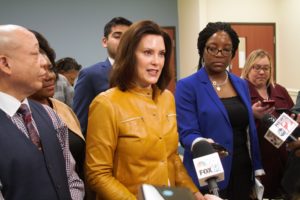
Michigan Governor Gretchen Whitmer speaking to the press at Flint’s Hamilton Community Health Clinic in late February 2020. (Photo by Tom Travis)
Incumbent Democrat Gov. Gretchen Whitmer is facing Republican Tudor Dixon, who won her party’s nomination in August. Dixon defeated four other candidates handily after getting a last-minute endorsement from former president Donald Trump. At one point there were as many as 10 candidates seeking the Republican nomination, but five were disqualified prior to the August primary for invalid signatures. At the moment polls give Whitmer a lead and she has a significant advantage in campaign funds.
Also running are minor party candidates; Libertarian Party, Mary Buzuma; U.S. Taxpayers Party, Donna Brandenburg; Green Party, Grant Hogan; and Natural Law Party, Daryl Simpson.
Secretary of State: Jocelyn Benson (D) v. Kristina Karamo (R)
Incumbent Democrat Jocelyn Benson is facing Republican Kristina Karamo, who has often claimed that the 2020 election was invalid and fraudulent. Also running are minor party candidates, Libertarian Gregory Stempfle; U.S. Taxpayers Party, Christine Schwartz; Green Party, Larry Hutchinson Jr.

At a press conference with State of Michigan officials in March of 2020. (front row l to r) Attorney General Dana Nessel, Michigan Lt. Governor Garlin Gilchrist, and Secretary of State Jocelyn Benson. (back row l to r) Flint Mayor Sheldon Neeley, Michigan 2020 Statewide Census Director Kerry Ebersole Singh and Burton Mayor Duane Haskins. (Photo by Tom Travis)
Attorney General: Dana Nessel (D) v. Matthew DePerno (R)
Incumbent Democrat Dana Nessel is being challenged by Republican Matthew DePerno in the race for attorney general. Like Karamo, DePerno has often argued that the 2020 election was fraudulent; also, he faces potential criminal charges over his actions following the election. The minor party candidates running for the attorney general position are; Libertarian Party, Joseph McHugh Jr., and U.S. Taxpayers Party, Gerald Van Sickle.
U.S. Representative: Dan Kildee (D) v. Paul Junge (R)
In the 8th Congressional District, Democratic incumbent Dan Kildee is running for his sixth term and is facing Republican Paul Junge. The newly created 8th Congressional District runs from Genesee County up to Bay County and includes parts of Midland County. Based on past voting results it leans more Republican than the old 5th District that was Dan Kildee’s base for most of the last decade, and it may be the most competitive race Kildee and the Democrats have seen. Both candidates have invested heavily in media campaigns.
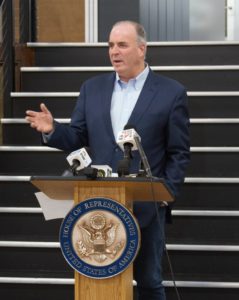
Congressman Dan Kildee speaking at a press conference in Flint after the Jan. 6 insurrection. (Photo by Tom Travis)
The minor party candidates running in the 8th District are, Libertarian Party, David Canny, and Working Class Party, Kathy Goodwin.
Michigan State Senate
There are 38 members of the Michigan State Senate. They serve four-year terms and are limited to two terms.
27th State Senate District: John Cherry (D) v. Aaron Gardner (R)
The newly drawn 27th State Senate District includes the northern two-thirds of Genesee County, including the City of Flint, Flushing, Swartz Creek, and Burton. Incumbent Democratic Senator Jim Ananich is term-limited. Incumbent Democratic state Representative John Cherry is facing Republican Aaron Gardner for Ananich’s Senate seat.
Michigan House of Representatives
There are 110 members of the Michigan State House. They serve two-year terms and are limited to three terms.
The 68th state House District: Cheri Hardmon (D) v. David Martin (R)
The newly-drawn 68th state House district includes much of southeastern Genesee County, Burton, Davison, and a part of northern Oakland County. Democrat Cheri Hardmon is challenging Republican incumbent David Martin.
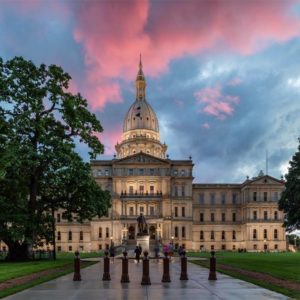
Michigan State Capitol building in Lansing. (Photo source: Michigan State Capitol Facebook page)
The 69th State House District: Jasper Ryan Martus (D) v. Jesse Couch (R)
The newly-drawn 69th District covers much of northwest Genesee County
Democrat Jasper Martus is facing Republican Jesse Couch for the state House seat. Libertarian Adam Childress is also a candidate in the 69th District.
The 70th state House District: Cynthia Neeley (D) v. Tim Butler (R)
State House District 70 includes all of the City of Flint
In the heavily Democratic City of Flint incumbent Democrat Cynthia Neeley is facing Republican Tim Butler.
State Supreme Court
Voters will be electing two justices to the State Supreme Court for eight-year terms. Incumbents Richard Bernstein and Brian Zahra are facing challenges from Kyra Bolden, Paul Hudson and Kerry Morgan.
State Board of Education and University Boards
Voters will also be electing two members to the State Board of Education, as well as the governing boards of the University of Michigan, Michigan State University, and Wayne State University.
Genesee County Commission
There are nine members on the Genesee County Commission and they serve two-year terms.
District 1: (north east Flint city), Incumbent Democrat Bryant Nolden, is facing Republican Steven Cousino.
District 2: (central and south Flint city) Democratic incumbent Charles Winfrey is running against Republican Lynette Robinson.
District 3: (Burton, Davison Township) Democratic incumbent Ellen Ellenburg is facing Republican Nicholas Goyette.
District 4: (Mundy Township, Grand Blanc Township) Democratic incumbent Domonique Clemons is facing Republican Amy Miller.
District 5: (Grand Blanc City, Atlas Township) Incumbent Democrat James Avery is facing Republican Teri Lynn Chambers.
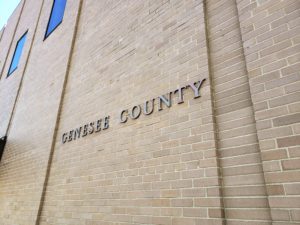
Genesee County building downtown Flint. (Photo by Tom Travis)
District 6: (Gaines, Argentine, Fenton Townships) Incumbent Republican Shaun Shumaker is the only candidate in the race. There is no Democratic candidate.
District 7: (Montrose, Vienna, Thetford, Mt. Morris Townships) Democrat Martin Cousineau I is running against Republican Lynn Culver. The incumbent commissioner, Debra Newman did not file for another term.
District 8: (Flushing, Clayton, parts of Flint Townships) Republican incumbent Meredith Davis is being challenged by Democrat Dale Weighill.
District 9: (Genesee, Forest, Richfield Townships, Davison city) Democrat Michelle Davis is facing Republican Sue Hopper. Incumbent Democrat Gary Peppin is not running.
Judicial elections
Voters will also be electing a judge for the 7th Circuit Court District in a non-partisan race. Circuit Court judges serve six-year terms. Those running are Mary Hood, and Dawn Weier. Several other judges are running unopposed for their positions.
School Board elections
Most area school boards are electing members as well. In Flint five members are to be elected and 15 candidates have filed to run for the Flint Community School Board, which has faced much turmoil and conflict recently. School boards used to be quiet, non-controversial elections, but conflicts over Critical Race Theory, gender roles, and the pandemic have often made them the center of controversy.

FCS Administration building. (Photo by Tom Travis)
In a number of the local races slates of candidates have come together with the hope of being elected as a team. Some are backed by the Democratic Party, some by the Republican Party, others simply geared towards working together.
In Flint Michael Clack, Emily Doerr, Melody Releford, Terae King Jr. and Dylan Luna are running together as a team.
The others running in Flint are: incumbent Linda Boose, Claudia Perkins, Lakeisha Tureaud, incumbent Carol McIntosh, incumbent Chris Del Morone, Audrey Young, Leslie Haney, Casey Calvert, incumbent Allen Gilbert and Donyele Darrough.
Mott College Board
Mott Community College is also electing trustees. Incumbents Art Reyes and Anne Figueora are facing challenges from Wendy Wolcott and Art Marden, for a full six-year term. Rebecca Garske, Jeffrey Swanson, and Beth Cooper are running for a two-year term.
Township elections and city elections
Elections are also being held for several positions in Flint, Mt. Morris, Richfield and Vienna Townships. The cities of Linden, Montrose, Mt. Morris, Swartz Creek and Davison, are holding elections for city council or mayoral elections. The villages of Otter Lake, Otisville, Lennon, Gaines and Goodrich are also electing local trustees and council members.
Ballot proposals
In addition to the three state-wide proposals, many Genesee County governments and school districts will have millages and proposals on their local ballots. In Flint, voters will be voting on renewing a 2 mill police services millage, and Genesee County voters will be voting to renew a .09 mill veteran’s service millage.
Where to learn more
Voters can register to vote, view sample ballots, locate their polling place, and find more information with Voter Information Center at the Michigan Secretary of State’s website www.Michign.gov/sos/resources. Information is also available at the Genesee County Clerk’s website, or at the League of Women Voters Vote411.org website.
There’s a lot at stake this year. Take the time to vote and make your voice heard.
EVM political writer and commentator Paul Rozycki can be reached at paul.rozycki@mcc.edu.
Banner photo: Voters lined up at Flint City Hall on election day. (Photo by Tom Travis)


You must be logged in to post a comment.